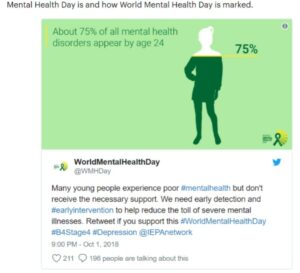By Taliaz

October, 2018 //
October 10th was World Mental Health Day. A highly important day focused on raising awareness around mental health and highly supported by us at Taliaz.
Mental health is often considered as a disorder that hides in plain sight. It is something we often feel is rare and “happens to someone else”. Yet this is not the case – and raising awareness around these topics is exactly why World Mental Health Day is so critical.
Mental health is in fact common and VERY widespread – and can start very early in our lifespan:
- Half of all mental illness begins by the age of 14. Even worse, most cases go undetected and untreated according to the WHO.
- One in five adults (17.9 percent) in the USA alone experience a mental health disorder according to the National Institute of Mental Health (NIMH).
- 1/2 of all workers suffer from mental health, according to a recent U.K. employee survey from MIND (the mental health charity).
So what is mental illness and its impact?
Mental illness is a disease that causes mild to severe disturbances in thought and/or behavior, resulting in an inability to cope with life’s ordinary demands and routines. There are more than 200 classified forms of mental illness. Some of the more common disorders are depression, bipolar disorder, dementia, schizophrenia and anxiety disorders.
For those who suffer from mental illness – it is a devastating disease – affecting not only them, but their family and friends. The impact on quality of life is huge with mental health linked to educational problems, poverty, social problems and vulnerability to abuse. Furthermore, their psychological disorder can also contribute to other health problems and stressors. In essence, mental health can become a never-ending cycle of hardship if untreated.
As can be assumed, healthcare spending as a result is huge. In the U.S. alone, $210 billion is spent on mental health annually. When we consider this on a global scale, the situation is only going to get worse as more people are reaching old age.
These are scary statistics and there is a clear call throughout the healthcare world for new management strategies.
As the WHO tweeted, we need early detection and intervention to help reduce the toll of severe mental illness.

Changing the mental health treatment landscape with AI
AI provides us with a new way to treat mental illness. The explosion in data from wearables, medical devices, genomic data, medical health records, etc., has put a gold mine of real-world health data into our hands empowering doctors to be able to truly change treatment approaches.
AI gives us the opportunity to analyze this every-day data – to pick up those early warning signs – to personalize treatment and get patients on the right treatment sooner.
The problem we now face is how do we organize all this growing amount of information? How do we make it user friendly for our doctor? How can we analyze, sort and direct all this data in a simple way so our doctors are empowered to make more informed clinical decisions with their patients? AI-based technologies provides us with a solution to help prevent mental illness spiraling out of control.
From chatbot virtual therapists like WoeBot and Ellie, to early detection and long-term management, such as Quartet Health’s platform to integrate mental health and physical healthcare for improved health outcomes, the application of AI-driven mental health treatments is dawning.
At Taliaz, we are highly focussed on using data-driven AI technology to personalize treatment for patients suffering from mental illness.
Our first product, Predictix Antidepressants, now available in Europe and Israel, uses our holistic, scientific-based treatment algorithm. By using PREDICTIX, we provide a personalized report with predictive information about antidepressant drugs and which one is best suited to the patient’s genetic makeup and health record. Through looking at patient’s genetic data alongside clinical and demographic data, doctor’s gain a more complete health picture to find patients the right antidepressant sooner.
And this really matters – it is why Taliaz was founded. When we consider that suicide is the second cause of death amongst those between 15 and 29, and depression is the top risk factor leading to suicide, if we can better treat depression sooner, we can help save lives.
We at Taliaz are proud of the work we are doing. And our R&D team is already hard at work developing new solutions to help better treat mental illness.
Yet, though AI technologies have the ability to transform the mental health space, we each on a personal level have a role to play. We each must change – be more open, accepting and supportive to those loved ones, colleagues and even strangers who are suffering from mental illness.
Mental health sufferers are often locked in the dark. Through small acts as well as better understanding and treatment, we can support them to find the light.
Until next time, Dekel
Huge
